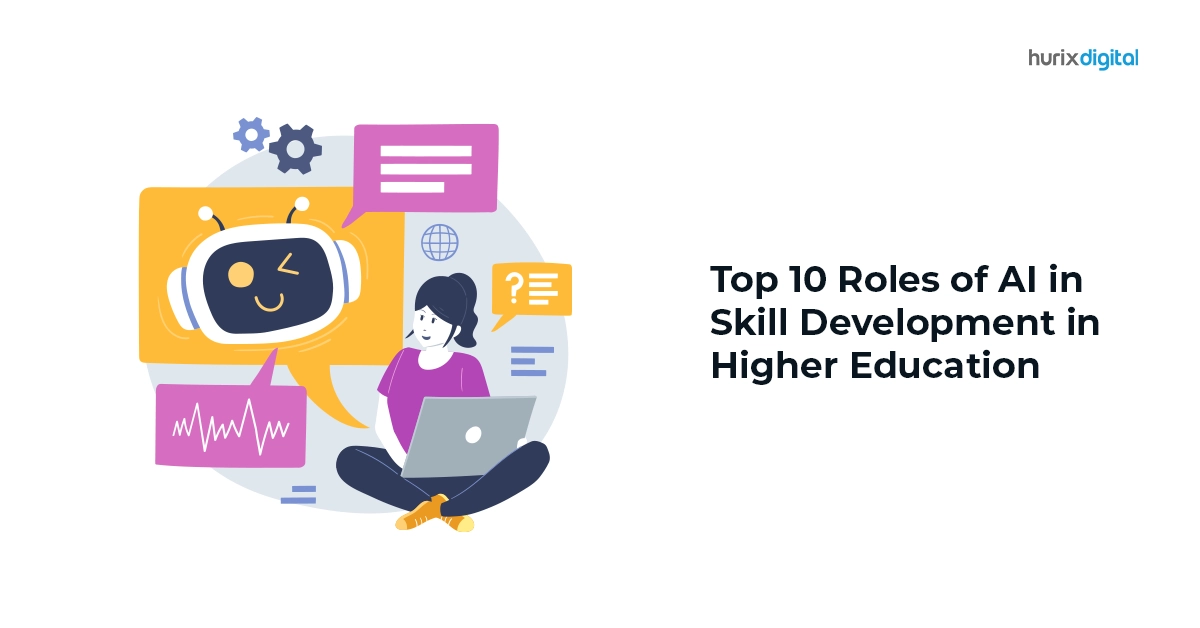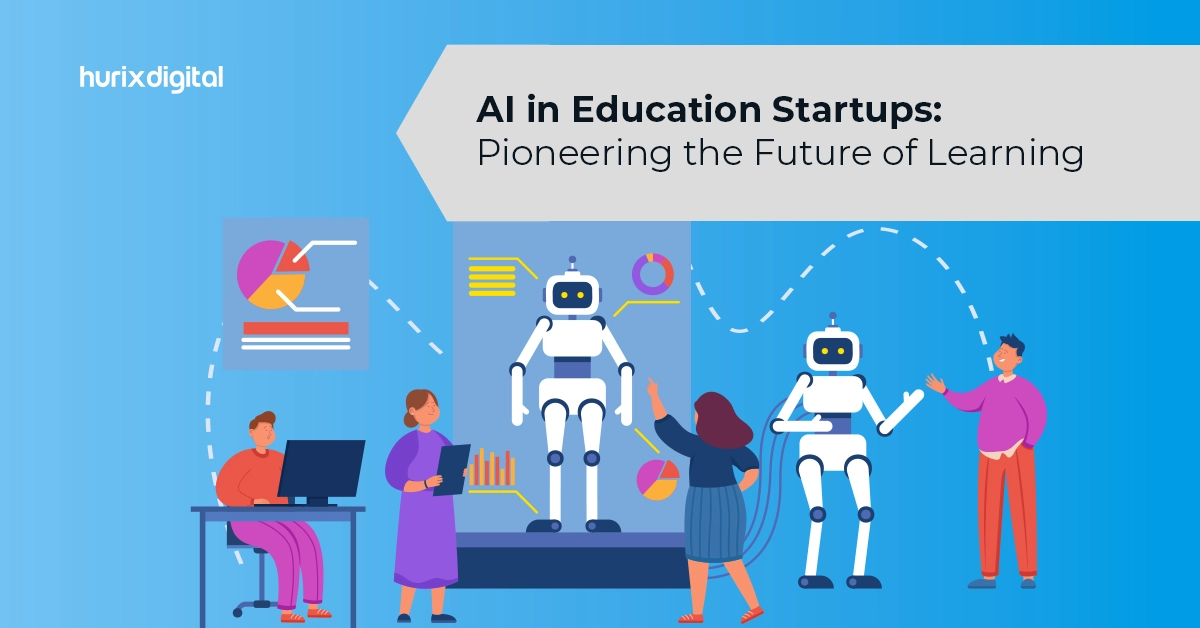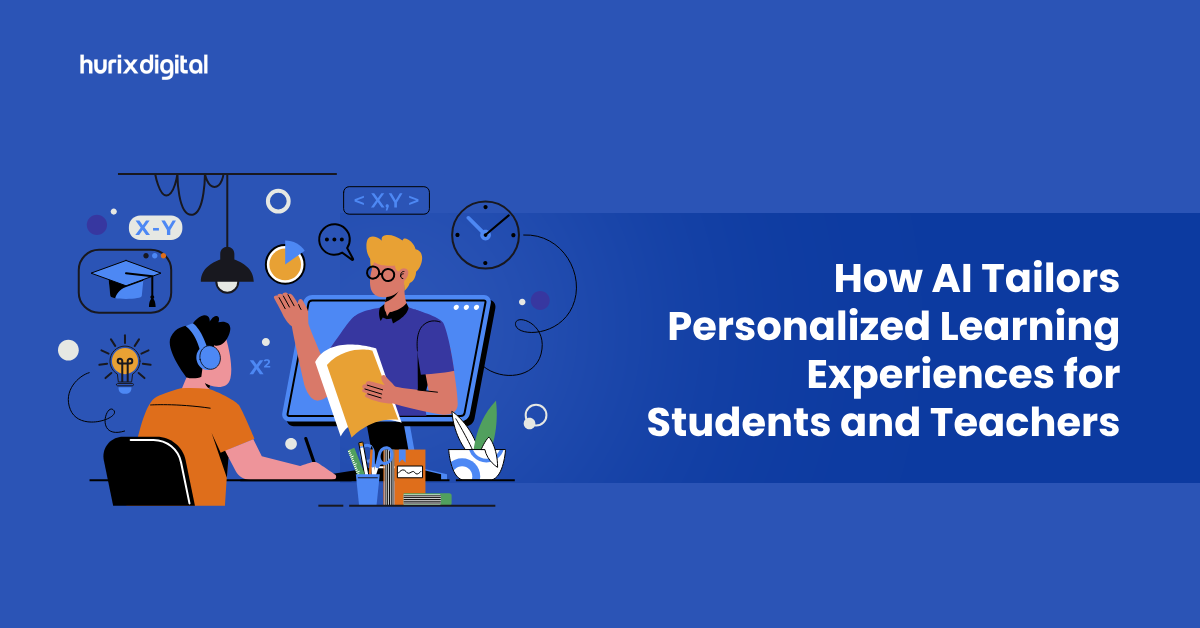Summary
This article has covered the basics of Artificial Intelligence, its impact on the education industry, and ten applications of AI in higher education that help nurture skill development.
It’s not shocking news that Artificial Intelligence (AI) has seeped into our everyday work in almost every industry; in a short time, AI has transformed our perspectives on embracing its applications.
In the process, there has been explosive growth in its impact and advantages. Using AI in education is no exception to this.
Today, we summarise what AI is, its impact on the education industry, and ten applications of AI in higher education that help nurture skill development.
Table of Contents:
- The Basics of AI
- Ten Ways AI in Higher Education Nurtures Skill Development
- Upgrades Focus: Personalized Learning
- Facilitates Innovation: Intelligent Tutoring Systems
- Enhances Overview of Needs: Learning Analytics
- Improves Feedback: Adaptive Assessment
- Strengthens Immersive Learning: AI-Powered VR & AR
- Reduces Manual Workload: Automated Tasks
- Accelerates Language Learning: Natural Language Processing
- Elevates Curriculum Quality: Gap Analysis
- Boosts Motivation: Gamification With AI
- Empowers Future Opportunities: AI-Powered Career Counselling
- The Essence of AI-Powered Education
The Basics of AI
AI has grown all around us, so it’s essential to glimpse how it functions.
With the help of algorithms, AI can process large amounts of data, and by subjecting it to iterations and training loops, it starts to recognize patterns, deduce relationships, and make predictions. When coupled with models such as neural networks, AI can fetch data from even media files such as photographs and videos.
With access to a data source and the help of feedback, AI’s abilities are refined, and its accuracy increases. Ultimately, this process of adapting and refining enables AI to learn.
With its adaptive methodologies, AI brings a few basic improvements in executing complex tasks efficiently and explaining concepts adjusted according to the learner’s comprehension levels. It has a vast scope and explosive potential when put to intelligent, correct, and ethical use.
Now, let’s dive in to learn 10 ways to apply AI in higher education and nurture skills development.
10 Ways AI in Higher Education Nurtures Skill Development
We will now delve into the top ten AI applications in learning modules that, without a doubt, play a crucial role in skill development!
1. Upgrades Focus: Personalized Learning
Tailoring the learning experience specifically to an individual student’s needs is possibly one of the most significant contributions of AI-enhanced education.
With the help of algorithms, AI analyzes a student’s learning style and preference based on performance reports. This data delivers targeted content, exercises, and assessments, addressing their unique strengths and weaknesses.
AI-powered personalized learning pathways enhance comprehension, foster a sense of ownership and motivation, and boost engagement.
2. Facilitates Innovation: Intelligent Tutoring Systems
When catering to students worldwide, EdTech innovations involve AI-powered intelligent tutoring systems acting as virtual tutors available 24/7.
AI uses performance data and adaptive learning strategies to cater to the concerned student’s learning needs. This application of AI in higher education offers real-time feedback and successfully augments traditional teaching methods to empower students to grasp complex concepts at their own pace.
Also Read: 5 Ways AI Analytics Can Supercharge Your Educational Strategy Right Now!
3. Enhances Overview of Needs: Learning Analytics
With the help of learning analytics, monitoring and assessing students’ academic performance in live time becomes seamless.
AI-driven learning experiences analyze data from online interactions, assessments, and collaborative activities and determine patterns and trends to inform educators about students’ progress and engagement levels. This data-driven approach enhances an educator’s overview of the learner’s needs.
4. Improves Feedback: Adaptive Assessment
AI in higher education plays a crucial role in real-time feedback and transparent improvement roadmaps. With the help of AI-powered assessments, education evolves into adaptive learning, which ultimately assists in learning modules that support the struggling and challenge the champions.
Adaptive assessments enable learning modules to be adapted and enhanced according to the learner’s real-time performance. Compared to traditional learning and even regular virtual learning modules, AI in higher education significantly reduces the average time to acquire almost every skill.
5. Strengthens Immersive Learning: AI-Powered VR & AR
With a market valuation of $20.1 billion, immersive technologies like Virtual Reality (VR) and Augmented Reality (AR) come with enormous benefits. These benefits range from high levels of motivation to even equipping learners with critical skills typically requiring large amounts of on-site experience.
VR and AR combined with AI in higher education results in an incredibly interactive learning module. With AI incorporating user preferences, cognitive aptitudes, and even live feedback, the right environment or VR and AR-based learning exercises can be delivered to produce much better experiences. With AI strengthening immersive learning, education becomes unbeatable.
6. Reduces Manual Workload: Automated Tasks
A recent survey found that 55% of educators reported spending at least 30 minutes on administrative duties in a working day. With evolving student needs, this time could otherwise be spent developing and enhancing their curriculum.
With AI in higher education, setting up automated tasks like updating records, assessments, calendars, etc., becomes seamless. By reducing the manual workload, AI plays a crucial role in allowing educators and learners to focus their resources on quality learning and development.
7. Accelerates Language Learning: Natural Language Processing
In today’s globalized world, acquiring new language proficiencies has become crucial. AI has a massive hand in accelerating regular learning times, particularly when powering Natural Language Processing (NLP). NLP is an application of computational techniques to analyze and synthesize natural language and speech.
This significantly improves the aptitude of online learning platforms to analyze a learner’s spoken and written skills and enables learning modules to share instant feedback on grammar and vocabulary usage.
AI in higher education language learning is vital in enhancing language acquisition while amalgamating its adaptive technology to personalize the modules according to a learner’s unique linguistic affinity.
8. Elevates Curriculum Quality: Gap Analysis
This is most probably one of the most prominent roles and applications of AI in higher education. Whether through personalized learning pathways or aggregated data from a larger demographic, arriving at a concrete curriculum is similar to setting the foundation of education for all aspiring to achieve and acquire knowledge.
AI can perform a gap analysis of learners’ skills based on their performance and displayed aptitude towards subjects.
Furthermore, based on interactions and responses to current affairs, AI can help elevate the quality of a student’s curriculum. It can even establish curriculums with a different delivery pattern and sequence and even include specialized content for students who excel or lack in specific areas.
9. Boosts Motivation: Gamification With AI
Games always mellow down tensions and raise spirits. Gamification in education is a relatively new concept where gaming elements such as quizzes, reward points, and interactive stories are introduced to help learners stay excited and motivated to learn.
When AI is weaved into gamified learning modules, along with the existing motivation from gaming elements, AI can assess the motivation levels, progress, and preferred game formats to suggest more engaging educational content to enhance motivation levels even further.
10. Empowers Future Opportunities: AI-Powered Career Counseling
Career counseling is an integral part of a student’s journey and is traditionally addressed through in-person interactions with a record of student performances. Introducing AI in this crucial stage improves the session’s overall quality and enhances career possibilities transparency.
With performance data, aptitude tests, and student aspirational information, AI-powered career counseling can offer roadmaps to achieve said aspirations and show what fits best with current performance data.
In retrospect, be it improving the quality of the learning module, enhancing the benefits of existing educational technology, or even improving the future of a learner’s educational roadmap, the impact of AI in higher education is undeniably explosive.
Also Read: Future-Proofing Education: Adapting to Change with AI Question Generation Technologies
The Essence of AI-Powered Education
As we discovered in this blog, AI accelerates linguistic skills, enhancing the immersive learning experience and even personalized learning modules that adapt to learners’ performance.
AI in higher education now breaks boundaries as it uses sophisticated algorithms and extends to career counseling sessions and curriculum enhancement. Designing an ideal learning module without AI is gradually becoming unimaginable.
As you aim to deliver excellence, embracing AI in higher education is crucial. Stay ahead of the curve and explore the seamless learning solutions created by Hurix Digital that will no doubt fit your objectives like a glove! Contact us now to get started on the ideal AI-powered learning module!








